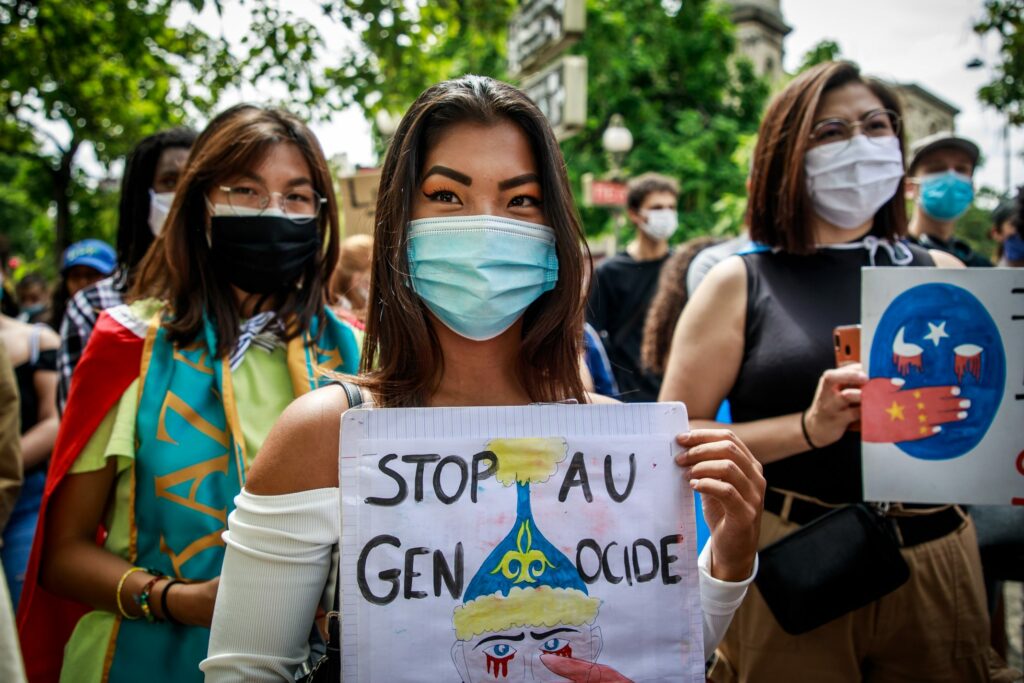News
Europe can no longer ignore human rights abuses against the Uyghurs in its dealings with China
The EU Member States shall have a common strategy and adopt a united and holistic position in their dealings with China and they should seriously consider adopting measures, such as creating a European Forced Labor Prevention Act, boycotting Beijing Winter Olympics in 2022, sending an EU fact-finding mission on human rights abuses in Xinjiang region, ramping up scrutiny of Confucius Institutes and town twinning with Chinese cities as well as making any future deal with China conditional on respect for human rights.
New Europe, 16 October 2020
by Eli Hadzhieva / Photo credits: EPA-EFE//Christophe Petit Tesson
As plans were revealed that China stepped up its investments in Italy, including the building of new ports in Venice and Trieste as part of its Belt and Road Initiative, activists accuse European governments and companies with being complicit to China’s ethnic cleansing policies against its Uyghur population, highlighting China’s increasing use of forced labour in detention camps in the Xinjiang region.
The region is a major source for Chinese petrochemicals, agriculture, textiles, and cotton, accounting for more than 80% of Chinese cotton production. The Forced Labour Prevention Act was passed in the US on September 22 to ban imports from China’s Xinjiang autonomous region suspected to be produced through the use of forced labor among China’s ethnic minorities.
Although the EU increasingly views China as a ‘systemic rival’, such punitive acts are not on the Union’s agenda yet. Even following a frosty EU-China Summit, a new scheme to fight back against Chinese subsidies, an investment screening mechanism to protect the European industry from Chinese acquisitions and increased scrutiny for ensuring the security of 5G networks, the EU still retains a pragmatic approach to its relations with the trade giant, sometimes in contradiction with its own values. Especially given the Chinese influence in the EU owing to the 17+1 format.
A conference organised by the European Foundation for Democracy this week highlighted gross human rights violations in Xinjiang ‘re-education’ camps, where more than 1 million Uyghurs are detained, including disappearances, forced sterilisation, political indoctrination, and torture.
Since 2017, the Chinese regime has banned the language and religion of the Uyghurs, even destroying graveyards and religious sites, under the guise of the fight against extremism. The Uyghur human rights activist Rushan Abbas compared the barbaric acts of China, which went so far to use the Uyghur minority as ‘guinea pigs’ for COVID-19 vaccines, to Germany’s Nazi regime, underscoring the obligation of the international community to stop such crimes against humanity under the UN Genocide Convention of 1948.
While experts discussed insidious Chinese tactics to silence researchers focusing on the situation of the Uyghurs, such as intimidation, the spread of disinformation, threat to cut funding, mobilisation of Chinese students, they invited European governments, universities and media to stay firm behind EU values, such as democracy and human rights.
The EU’s efforts to grant the Sakharov Prize to jailed Uyghur academic Ilham Tohti in 2019 was definitely a step in the right direction. Such is the EU’s current work to establish a Magnitsky Act for the bloc, a mechanism allowing to impose sanctions on people suspected of human rights abuses, similar to the one in the US. Yet, these measures may not be sufficient to stop the human tragedy in Xinjiang.
The EU Member States shall have a common strategy and adopt a united and holistic position in their dealings with China and they should seriously consider adopting measures, such as creating a European Forced Labor Prevention Act, boycotting Beijing Winter Olympics in 2022, sending an EU fact-finding mission on human rights abuses in Xinjiang region, ramping up scrutiny of Confucius Institutes and town twinning with Chinese cities as well as making any future deal with China conditional on respect for human rights.
If the EU’s current pragmatic approach aiming to preserve trade and economic relations with China continues, the Union would risk importing the Chinese human rights model at the expense of its values, and no one could guarantee that forced labour camps would not be established on European soil in the future, repeating the worst horrors of history.
The original article is available here: https://www.neweurope.eu/article/europe-can-no-longer-ignore-human-rights-abuses-against-the-uyghurs-in-its-dealings-with-china/?fbclid=IwAR3ZdvUI3lNkCGNJcz1vun1Yrcu1y2cftSfUF8RbDzw2D1BYWKvhb2nJHWs

